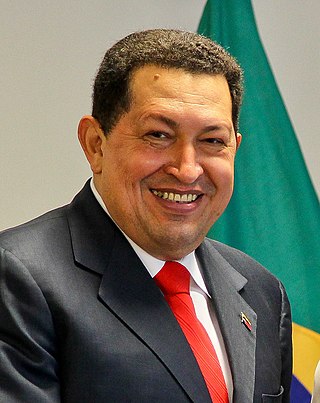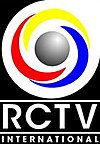Mass media in Venezuela comprise the mass and niche news and information communications infrastructure of Venezuela. Thus, the media of Venezuela consist of several different types of communications media: television, radio, newspapers, magazines, cinema, and Internet-based news outlets and websites. Venezuela also has a strong music industry and arts scene.

Hugo Rafael Chávez Frías was a Venezuelan politician who was president of Venezuela from 1999 until his death in 2013, except for a brief period in 2002. Chávez was also leader of the Fifth Republic Movement political party from its foundation in 1997 until 2007, when it merged with several other parties to form the United Socialist Party of Venezuela (PSUV), which he led until 2012.

Venevisión is a Venezuelan free-to-air television channel and one of Venezuela's largest television networks, owned by the Cisneros Media division of Grupo Cisneros.

The Revolution Will Not Be Televised, also known as Chávez: Inside the Coup, is a 2003 Irish documentary film. It focuses on events in Venezuela leading up to and during the April 2002 coup d'état attempt, which saw President Hugo Chávez removed from office for two days. With particular emphasis on the role played by Venezuela's private media, the film examines several key incidents: the protest march and subsequent violence that provided the impetus for Chávez's ousting; the opposition's formation of an interim government headed by business leader Pedro Carmona; and the Carmona administration's collapse, which paved the way for Chávez's return. The Revolution Will Not Be Televised was directed by Irish filmmakers Kim Bartley and Donnacha Ó Briain. Given direct access to Chávez, the filmmakers intended to make a fly-on-the-wall biography of the president. They spent seven months filming in Venezuela, following Chávez and his staff and interviewing ordinary citizens. As the coup unfolded on 11 April, Bartley and Ó Briain filmed on the streets of the capital, Caracas, capturing footage of protesters and the erupting violence. Later, they filmed many of the political upheavals inside Miraflores, the presidential palace.
Hugo Chávez, the President of Venezuela from 1999 until 2013, has elicited a variety of public perceptions regarding his policies, personality, and performance as a head of state.

Radio Caracas Televisión (RCTV) was a Venezuelan free-to-air television network headquartered in the Caracas neighborhood of Quinta Crespo. It was sometimes referred to as the Canal de Bárcenas. Owned by Empresas 1BC, Radio Caracas Televisión (RCTV) was inaugurated on 15 November 1953 by William H. Phelps, Jr. Its radio counterpart was Radio Caracas Radio.

Globovisión is a 24-hour television news network. It broadcasts over-the-air in Caracas, Aragua, Carabobo and Zulia on UHF channel 33. Globovisión is seen in the rest of Venezuela on cable or satellite and worldwide from their website. Some of Globovisión's programs can be seen in the United States on cable network Canal Sur and TV Venezuela, a channel offered in DirecTV's Para Todos package. In Latin America, Globovision can be seen in Argentina, Colombia, Chile, Ecuador, Peru, Uruguay and other territories as Aruba, Trinidad and Tobago, Barbados and Curaçao in DirecTV's package.

Televen is a private Venezuelan national television network headquartered on the Caracas neighborhood of Horizonte. For this reason it is also called 'Canal de Horizonte'. Televen was inaugurated as the TELEVEN Corporation on July 10, 1988, by Omar Camero Zamora and T Radioven, S.A. As an alternative for the two-leading-private TV Networks on Venezuela, Radio Caracas Televisión (RCTV) and Venevision, Televen distanced itself from this trend and made a different oriented programming in some cases the middle classes who do not usually watch TV and it was open and being composed of talk shows, sports, movies, a full range of series, mainly American, and Brazilian, Colombian, Mexican, and U.S. Hispanic telenovelas, and in the 1990s, anime.
El Observador was the Spanish language newscast of Radio Caracas Televisión (RCTV). It is one of the first television news programs in Venezuela.
Radio Rochela was a Venezuelan television sketch comedy and variety show, created by Argentine producer Tito Martinez Del Box.

The RCTV protests were a series of protests in Venezuela that began in the middle of May 2007. The cause of the protests was the decision by the government to shut down Venezuela's oldest private television network, Radio Caracas Televisión (RCTV), refusing to renew its broadcasting license and instead creating a new public service channel called TVes, which began operations on 28 May, the same day RCTV's license expired. RCTV had Venezuela's largest viewing audience, with 10 million of the country's 26 million people viewing its shows and soap operas.
Marcel Granier Haydon is a Venezuelan businessperson. He is the President and CEO of Empresas 1BC and the General Director of Radio Caracas Televisión (RCTV), which until becoming a cable TV-channel on May 27, 2007, was the most watched television channel in Venezuela.

The Republic of Venezuela was a democratic republic first established in 1958, and replaced in 1999 by the Bolivarian Republic of Venezuela. Venezuela saw ten years of military dictatorship from 1948 to 1958. After the 1948 Venezuelan coup d'état brought an end to a three-year experiment in democracy, a triumvirate of military personnel controlled the government until 1952, when it held presidential elections. These were free enough to produce results unacceptable to the government, leading them to be falsified and to one of the three leaders, Marcos Pérez Jiménez, assuming the Presidency. His government was brought to an end by the 1958 Venezuelan coup d'état, which saw the advent of democracy with a transitional government under Admiral Wolfgang Larrazábal in place until the December 1958 elections. Prior to the elections, three of the main political parties, Acción Democrática, COPEI and Unión Republicana Democrática, with the notable exclusion of the Communist Party of Venezuela, signed up to the Puntofijo Pact power-sharing agreement.

Venezuelan protests for and against President Hugo Chávez's proposed 2 December constitutional referendum occurred after the National Assembly approved the referendum on 2 November 2007.

Censorship in Venezuela refers to all actions which can be considered as suppression in speech in the country. Reporters Without Borders ranked Venezuela 159th out of 180 countries in its World Press Freedom Index 2023 and classified Venezuela's freedom of information in the "very difficult situation" level.

X-Ray of a Lie is a 2004 documentary film examining another film, The Revolution Will Not Be Televised about the events of the Llaguno Overpass events, before the 2002 Venezuelan coup d'état attempt. The X-Ray documentary, directed by Wolfgang Schalk and written by Schalk and Thaelman Urgelles, accuses Kim Bartley and Donacha O'Briain of omissions and distortion in The Revolution Will Not Be Televised. It premiered on DVD in Venezuela in July 2004.
Television in Venezuela began in 1952, when the president Marcos Pérez Jiménez launched the state channel Televisora Nacional, making Venezuela the ninth country in the world to have a public television network. By 1963, a quarter of Venezuelan households had television; a figure rising to 45% by 1969 and 85% by 1982. Telenovelas are popular in Venezuela, and some Venezuelan productions are distributed internationally. Perhaps the best known television show internationally was President Hugo Chávez' weekly talk show Aló Presidente, which began in 1999 and ended in 2012. The government also makes regular use of cadenas.

Bolivarian propaganda is a form of nationalist propaganda, especially in Venezuela, that utilizes the ideals espoused by Simón Bolívar, who helped lead Venezuela and other Latin American countries to independence from Spain, to exploit populist sentiments in support of local leaders. This type of propaganda has been particularly associated with Hugo Chávez's Bolivarian Revolution, which used emotional arguments to gain attention, exploit the fears of the population, create external enemies for scapegoat purposes, and produce nationalism within the population, causing feelings of betrayal for support of the opposition. The World Politics Review stated that, as Chávez began "transforming Venezuela into a socialist state", propaganda was "an important role in maintaining and mobilizing government supporters". The image of Chávez is seen on sides of buildings, on T-shirts, on ambulances, on official Petróleos de Venezuela (PDVSA) billboards, and as action figures throughout Venezuela. A 2011 article by The New York Times says Venezuela has an "expanding state propaganda complex" while The Boston Globe described Chávez as "a media savvy, forward-thinking propagandist" and that he had "the oil wealth to influence public opinion".

Movimiento Estudiantil is a student movement started in 2007, made up of students who organized in opposition to the government of the President of Venezuela, Hugo Chávez. According to several analysts, it had a decisive effect on the rejection of the Venezuelan constitutional referendum of 2007.













